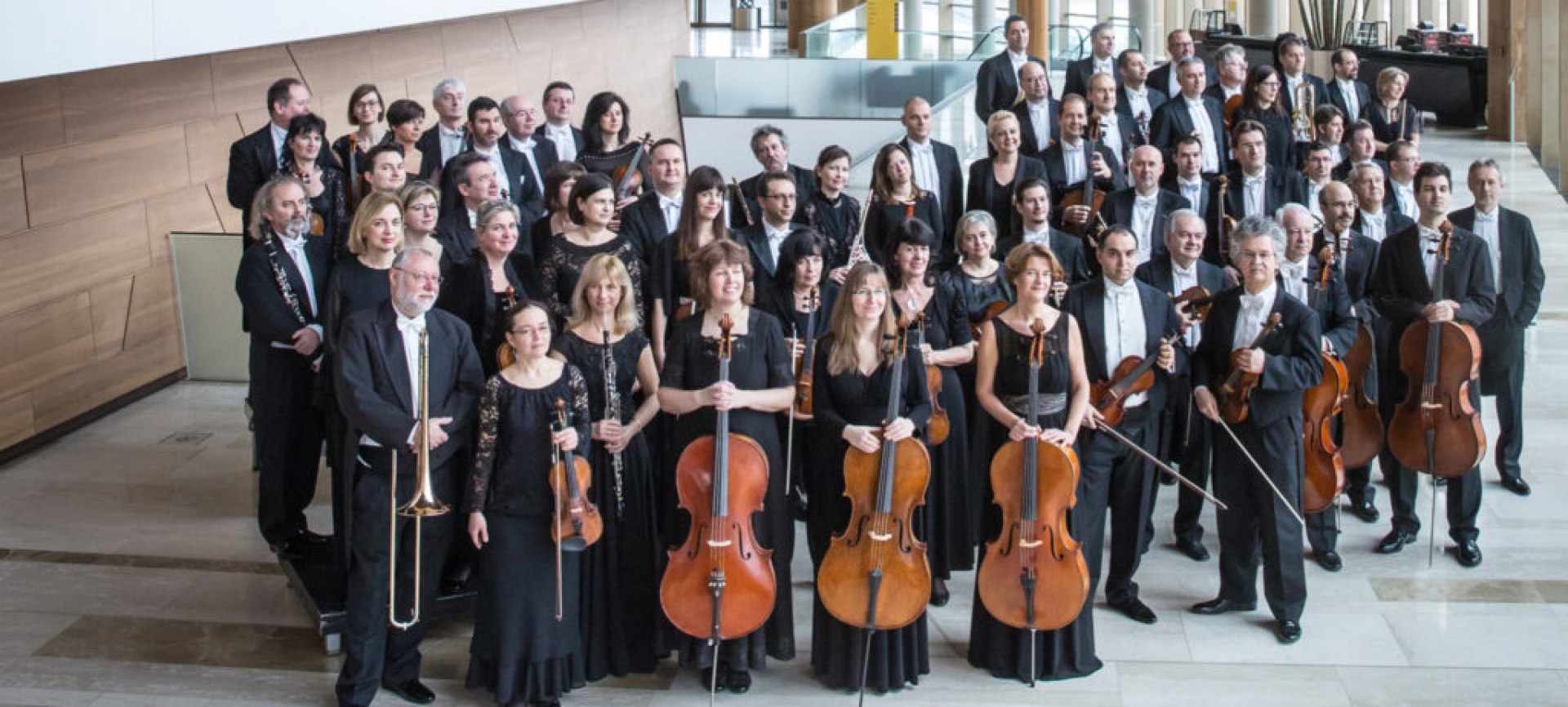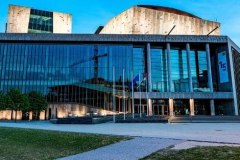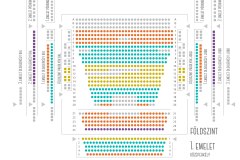Hungarian National Philharmonic Orchestra
Mo | Tu | We | Th | Fr | Sa | Su |
Sebastian Weigle and the Hungarian National Philharmonic Orchestra and Choir
The members of any orchestra feel most confident playing under the batons of conductors who know from personal experience the ins and outs of performing instrumental music. And this is exactly the extra bit of expertise possessed by the German horn player-turned-conductor Sebastian Weigle, who also earned the respect of the audience at the Béla Bartók National Concert Hall when he took on Rienzi in 2017 and Ein deutsches Requiem in 2020 at the venue. Now he returns to rejoin his collaborator for those memorable concerts, the Hungarian National Philharmonic Orchestra. On this evening, Müpa Budapest’s resident ensemble will first accompany Dezső Ránki in performing Brahms’s grand B-flat major piano concerto. It will then play Liszt’s Faust Symphony, which is rich with the ideas of Goethe, together with the Hungarian National Male Choir. The soloist of the evening is the Graz-born heldentenor, Nikolai Schukoff, who in 2009 sang the title role of Parsifal at the Budapest Wagner Days festival, and in 2024 partnered Diana Damrau here at Müpa Budapest.
Program and cast
October 3, 2025
Conductor: Sebastian Weigle
Piano – Dezső Ránki
Tenor – Nikolai Schukoff
Hungarian National Philharmonic Orchestra
Hungarian National Male Choir
Program
Johannes BRAHMS: Piano Concerto No. 2 in B-flat major, Op. 83
Intermission
Franz LISZT: Faust Symphony, S. 108
October 8, 2025, Wednesday, 7:30 PM
Valentin Magyar – piano
Hungarian National Philharmonic Orchestra
Conductor: Carlo Montanaro
Program
Bedřich SMETANA: The Bartered Bride – Overture
Pyotr Ilyich TCHAIKOVSKY: Piano Concerto No. 1 in B-flat minor, Op. 23
–
Modest MUSSORGSKY – Maurice RAVEL: Pictures at an Exhibition
Expected end: 9:30 PM
November 26, 2025, Wednesday, 7:00 PM – VERDI: NABUCCO (Opera/1)
Nabucco – Amartüvshin Enkhbat
Abigaille – Maria José Siri
Zaccaria – Evgeny Stavinsky
Fenena, daughter of Nabucco – Szilvia Vörös
Ismaele, King of Babylon – István Horváth
Anna, sister of Zaccaria – Ágnes Kristófi
Abdallo, officer of the King of Babylon – Donát Varga
High Priest of Baal – István Gáspár
Hungarian National Philharmonic Orchestra
Hungarian National Choir (choir director: Csaba Somos)
Conductor: Andrea Battistoni
December 17, 2025, Wednesday, 7:30 PM – CHRISTMAS CONCERT (Festive concert of the Hungarian National Philharmonic)
Hector BERLIOZ: L’enfance du Christ (The Childhood of Christ), Op. 25
Oratorio in French
The Narrator / The Centurion: Cyrille Dubois
The Virgin Mary: Anna Dowsley
Joseph / Polydorus: Lysandre Châlon
Herod / The Father of the Family: Thomas Dolié
Hungarian National Philharmonic Orchestra
Hungarian National Choir (choir director: Csaba Somos)
Conductor: György Vashegyi
January 14, 2026, Wednesday, 7:00 PM – LÉO DELIBES: JEAN DE NIVELLE (Opera/2)
Concert performance in three acts, with one intermission, in French
Jean de Nivelle – Cyrille Dubois
Arlette – Mélissa Petit
Simone – Marie-Andrée Bouchard-Lesieur
Diane – Judith van Wanroij
Count of Charolais – Tassis Christoyannis
Malicorne – François Rougier
Beautreillis – Jean-Philippe Mc Clish
The Page Isolin – Juliette Mey
Saladin / A Herald / An Old Man – Adrien Fournaison
Hungarian National Philharmonic Orchestra
Hungarian National Choir (choir director: Csaba Somos)
Conductor: György Vashegyi
A co-production of the Hungarian National Philharmonic Orchestra and Palazzetto Bru Zane.
Recording for the French Opera series, released by the Bru Zane Label.
Score published by Heugel, revised by Palazzetto Bru Zane.
January 21, 2026, Wednesday, 7:30 PM
József Balog – piano
Hungarian National Philharmonic Orchestra
Conductor: Lawrence Foster
Program
Franz LISZT: Orpheus – Symphonic Poem, S. 98
Edvard GRIEG: Piano Concerto in A minor, Op. 16
–
Richard STRAUSS: Ein Heldenleben (A Hero’s Life) – Symphonic Poem, Op. 40
February 25, 2026, Wednesday, 7:30 PM
Aurélien Pascal – cello
Hungarian National Philharmonic Orchestra
Conductor: Jean-Claude Casadesus
Program
Claude DEBUSSY: Prélude à l’Après-midi d’un faune (Prelude to the Afternoon of a Faun), L. 86
Camille SAINT-SAËNS: Cello Concerto No. 1 in A minor, Op. 33
–
Camille SAINT-SAËNS: Symphony No. 3 in C minor, “Organ Symphony”, Op. 78
April 1, 2026, Wednesday, 7:30 PM
Selene Zanetti – soprano
Atala Schöck – alto
Francesco Demuro – tenor
Gábor Bretz – bass
Hungarian National Philharmonic Orchestra
Hungarian National Choir (choir director: Csaba Somos)
Conductor: Pier Giorgio Morandi
Program
Wolfgang Amadeus MOZART: Kyrie in D minor, K. 341
Wolfgang Amadeus MOZART: Orchestral excerpts from Thamos, King of Egypt, K. 345/336A
–
Gioachino ROSSINI: Stabat Mater
April 22, 2026, Wednesday, 7:00 PM – TCHAIKOVSKY: EUGENE ONEGIN (Opera/3)
Tatiana – Anna Shapovalova
Eugene Onegin – Alexey Markov
Olga – Gabriella Busa
Lensky – Szabolcs Brickner
Prince Gremin – Konstantin Fedotov
Madame Larina – Judit Varga-Szathmáry
Monsieur Triquet – Flórián Körmendy
Captain Burjanov / Zaretsky – Árpád Bence Labant
Filipyevna – Andrea Lehőcz
Hungarian National Philharmonic Orchestra
Hungarian National Choir (choir director: Csaba Somos)
Conductor: János Kovács
May 13, 2026, Wednesday, 7:30 PM
Alexander Malofeev – piano
Hungarian National Philharmonic Orchestra
Conductor: György Vashegyi
Program
Georges BIZET: L’Arlésienne – Suite No. 1
Camille SAINT-SAËNS: Piano Concerto No. 2 in G minor, Op. 22
–
Johannes BRAHMS: Symphony No. 3 in F major, Op. 90
Palace of Arts Müpa Budapest
When Müpa Budapest, Hungary and its capital's new cultural hub, opened in 2005, it was built to represent more than 100 years of Hungarian cultural history. As a conglomeration of cultural venues, the building has no precedent in 20th century Hungarian architecture and has no peers in the whole of Central Europe.
The creators of this ambitious project, the Trigránit Development Corporation, prime contractor Arcadom Construction and the Zoboki, Demeter and Partners Architectural Office, were driven by the desire to create a new European cultural citadel as part of the new Millennium City Centre complex along the UNESCO World Heritage-listed Danube waterfront. The result is a facility whose construction quality, appearance, functionality and 21st century technological infrastructure makes it ideally suited to productions of the highest standard. The building is also highly versatile and equipped to host performances of any genre and almost any scale.

 EN
EN DE
DE IT
IT FR
FR ES
ES RU
RU JP
JP RO
RO
 Seating plan
Seating plan 
